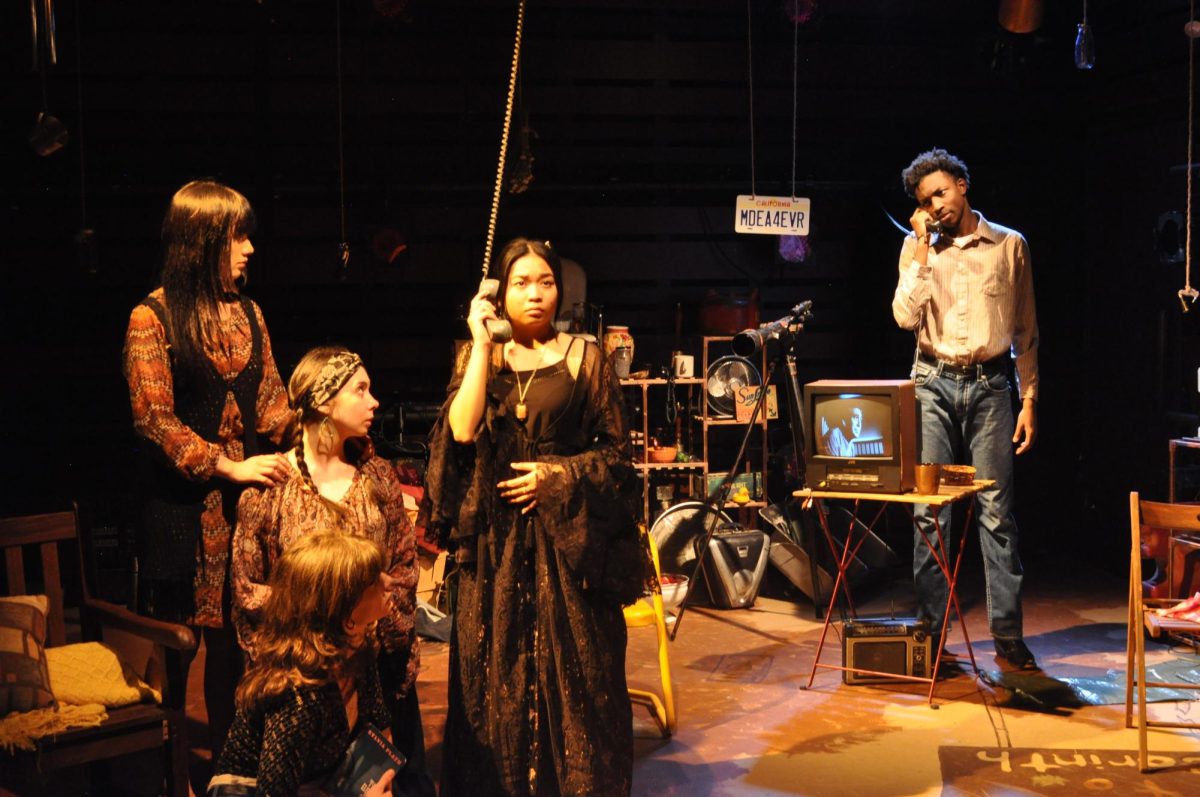“The Medea Thing.,” the senior thesis play written and directed by Cora Therber, Fordham College at Lincoln Center (FCLC) ’24, came alive in the Kehoe Theatre at Fordham Lincoln Center on March 9. The production reinvents the Greek myth of Medea, an enchantress who exacted ultimate revenge on her ex-lover. It is inspired by ancient dramatist Euripides’ play “Medea” based on the same myth.
The story follows the wild-hearted and volatile Medea (Melissa Bautista, FCLC ’24), who spirals into depravity as she loses sight of herself and her future. Set in the jiving 1970s, Medea’s tale is backlit by the social changes of the era, including the shifting status of women in a patriarchal society. The titular character holds her womanhood at arm’s length, where it burns in her gaze as an object of both sanctity and agony.
According to Therber, the play aims to interrogate the idea of social nonconformity that is expressed but not defined.
“I wondered what expressions of queer identity could look like coming from a more visceral place,” they said. “I set the play in a time when the verbiage of today was either nonexistent or difficult to access. What does identity look like without words?”
The other characters in the play are wrenched in and out of Medea’s emotional tempest. Jason (Jeremiah Onyango, FCLC ’24), her heedless beau-turned-traitorous-ex, is desperate to prove himself a hero and flaunts it in all the wrong ways. Glauce (Lynn Cheng, FCLC ’27), the sheriff’s daughter for whom Jason falls for, enters Medea’s orbit only to splinter upon getting too close.
Three women in town circle the conflicted main trio. Norma (Ryann Murphy, FCLC ’25), Charlotte (Fiona Nealis, FCLC ’27) and Doreen (Sarah Arata, FCLC ’26) seek Medea’s magical remedies for their troubles, but disturbingly end up falling under her spell.
When old crimes Jason and Medea committed threaten to catch up to them, Jason decides the only way to protect Medea is to abandon her and appease the town sheriff by courting Glauce. Medea suffers this terrible shock, in addition to mounting dissonance about her identity as a woman, a lover and a person seemingly too immense to belong anywhere.
Frantic for affirmation and control, Medea embroils herself in a drastic pursuit of agency — to birth and rear children. The ensuing tragedy leaves the audience guessing whether her actions were ultimately meant to create or to obliterate.
Therber’s writing deftly refreshes these hallmarks and brandishes elements that defy all convention.
“I was drawn to the question of who children belong to,” Therber said. “In the original Medea, and in Ancient Greek culture in general, children were not considered to be ‘related’ to their mothers. The mothers were vessels for the father’s children. In the setting of 1976, I wanted to ask questions about ownership of children and how parental influence shapes an identity.”
The set, which was also designed by Therber, draws viewers into a ramshackle mid-20th-century abode. Strewn with analog and retro decor that makes it feel more like a scrapyard than a home, the space reflects the fraught tensions between the characters that move about it. The old-school television, a still fixture amidst otherwise dynamic props, tells a story in moments hauntingly devoid of dialogue.
Oddly enough, “The Medea Thing.” has the makings of a coming-of-age tale — the despised ex, some gender trouble, and an instinctual terror of fate. However, Therber’s writing deftly refreshes these hallmarks and brandishes elements that defy all convention — a lesbian wedding officiated by puppet children, an impromptu Bruce Springsteen musical interlude, a low-slung diss on Sylvia Plath’s “The Bell Jar” and gay potion!
“The Medea Thing.” teeters on a raw nerve, where vulnerability and fury coalesce. In one scene, the characters cradle tenderness between them. In the next scene, they tear it apart and inflict unimaginable pain on one another in the process.
Bautista, who takes the stage for a final time at Fordham before her graduation, embodies this turbulence in a transfixing and guttural performance — one certainly not to be missed.
Therber’s adaptation of this infamous Greek mythological figure proves that Medea’s story has universal appeal and application, no matter the era.
“For me, theater is about carving out a space in your chest to let more love in,” Therber said. “I initially wrote this play for trans people, neurotic people and anyone who wants to puke after saying something genuine. I hope those people felt seen.”
Bitingly inventive and deeply impassioned, “The Medea Thing.” spins an ancient myth into a modern tale of its own might. The studio thesis production at Fordham Theatre will run from March 11-15 in the Kehoe Theatre.


